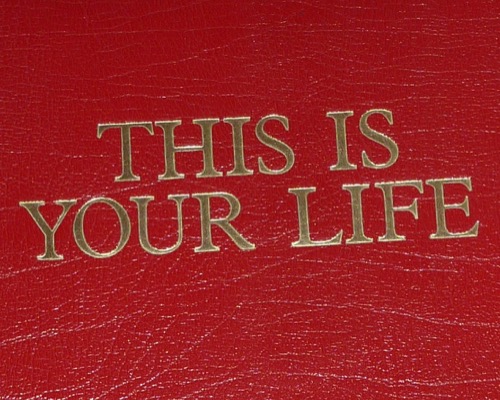Big Red Book
Celebrating television's This Is Your Life

a brief biography
a career review
the programme's icon
the man who created it all
surprised again!
Hollywood in the spotlight
those who said 'No'
The Sunday Times 17 November 1996
Ratings slump sounds death knell for This Is Your Life
By: Nicholas Hellen, Media Correspondent
This Is Your Life - but for how much longer? The BBC show that pays tribute to the stars has entered a sad old age of falling ratings and lacklustre subjects. Where once the show could command stars guaranteed to make its audience of 18m go "wow!", now its 6m viewers are more likely to greet the show's guest with "who?".
The likes of Lord Mountbatten and Ursula Andress [Bigredbook.info editor: Ursula was never a subject!], who were once featured on the show, have been replaced by the likes of Freddie Young, a cinematographer, and Jill Dando, a television presenter.
Insiders at the corporation are wondering how much life is left in the programme, first broadcast on the BBC in 1955. Even Michael Aspel, who took control of the show's trademark red book in 1988 from the late Eamonn Andrews, admitted last week: "I can understand people sharpening their knives and saying: is this the end for the show?"
One BBC executive said of the programme's producers, Pearson: "They have reduced it to a giggle." Pearson's three-year contract with the BBC, worth £13.5m, expires in March. Ralph Edwards, the American who created the show, is threatening to remove the UK rights from Pearson.
The success of the show has always rested on the calibre of its subjects. Last year it featured guests who would not have been out of place during its heyday. They included David Essex, Petula Clark, Bob Hope, Sir Peter Ustinov and Sir Andrew Lloyd Webber.
But the choice of celebrities in the current series has baffled even the subjects themselves. Jeremy Clarkson, presenter of the motoring programme Top Gear and a talented Sunday Times columnist, appeared last month. He said modestly last week: "I thought of myself as an E-list celebrity." Other recent subjects include Gary Rhodes, the chef, and John Motson, the football commentator.
A new production team has also made some awkward misjudgments. Jill Dando, the presenter of Crimewatch, was to be confronted with the red book at the Royal Variety Performance, until Aspel demanded a more appropriate setting. "It would have embarrassed everybody there," he said.
The shortage of high-calibre subjects is so acute that various showbusiness figures, including Spike Milligan, Sir Harry Secombe and Lloyd Webber have made repeat appearances. But others do not want to be on once, let alone twice: Sean Connery and Roger Moore, say sources close to the show, are among stars who have ordered their friends and family never to agree to take part.
The difficulty in attracting stars has not been helped by Pearson cancelling special shows from Hollywood. Insiders admit money, rather than editorial judgment, led to the switch. Aspel confirmed: "This will be the first time we won't have gone to America since I joined the programme in 1988. We are being run by accountants."
The fall in popularity has been precipitous. The show attracted an average 10.8m viewers per episode in 1993-94, its last series on ITV. But in the two years since it reverted to the BBC, it has dropped to 8.5m and now only 6.4m on average for its current run.
The programme's producers blame its fall in ratings on the BBC's decision to switch its place in the schedule from its habitual slot on Wednesday evening to Friday. Alan Boyd, in overall charge of the show, said: "It has one of the fiercest slots on television, in competition with The Bill on ITV."
Aspel, who is highly regarded by BBC management, believes the show is being damaged by schedulers who are more interested in propping up BBC1's weak Friday evening line-up than in the health of the programme. "We are pawns in a battle," he said. "It is an impossible slot. It is suicidal." Future episodes will go out one hour earlier and the show may be switched to an easier Monday night slot in January.
No decision has been made on the future of the show, but one insider admitted: "There is a problem and it is not being addressed. No big names have been on for a while. The team has been told to lower its horizons."
Aspel admits he has concerns about the new production team's policy of choosing younger subjects. "I would instinctively like to do it with people who have been around for a greater time. It works against us if we are in negotiations with the family on an important person and they see us feature a 19-year-old snooker player the week before. The programme should be about somebody who has had a life and has actually done something."
He still hopes the show will not find itself presenting its own obituary, This Was Your Life. He said: "The programme is a beacon of relentless niceness in a wasteland of very unpleasant television."
Evening Standard 12 December 1996
LIFE SUPPORT
LIKE SOME of its subjects, This Is Your Life is clearly heading towards its twilight years. The BBC, so short of real people to feature, has now resorted to interviewing its own reporters.
The latest subject to have the big red book thrust upon him is the Beeb's Foreign Affairs editor, John Simpson. It was an experience he did not enjoy.
'He found it incredibly embarrassing,' I am told. 'He had to keep this cheesy grin and pretend he was pleased to be on it, but I think he found it more frightening than being under fire in Sarajevo.'
But Simpson is clearly a good sport. Unlike Richard Gordon, author of Doctor in the House, who proved rather reluctant when confronted by former presenter Eamonn Andrews. He took one look at Andrews, shouted 'balls' and dashed away.